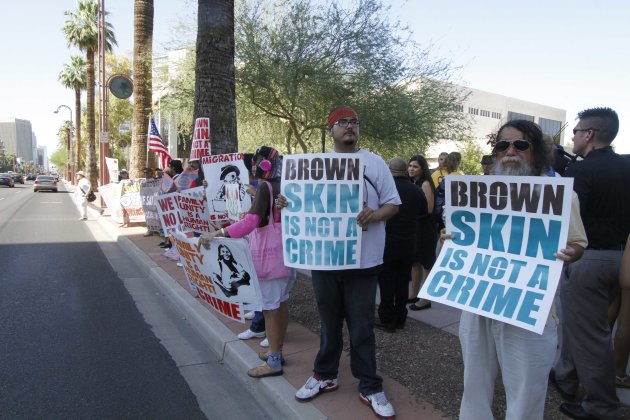By Tim Gaynor and David Schwartz
Sept. 6, 2012
Reuters/REUTERS - People hold signs as they gather during a protest against Senate Bill 1070 (SB-1070), in front of the Immigration and Customs Enforcement offices in Phoenix, Arizona, June 25, 2012. The U.S. Supreme Court on Monday upheld the main provision of Arizona's crackdown on illegal immigrants but threw out three other parts, handing partial victories to President Barack Obama in his challenge to the law and to the measure's conservative supporters. The court unanimously upheld the statute's most controversial aspect, a requirement that police officers check the immigration status of people they stop, even for minor offenses such as jay-walking. REUTERS/Darryl Webb
PHOENIX (Reuters) - A U.S. judge ruled on Wednesday that a controversial Arizona "show-your-papers" immigration provision that has been upheld by the Supreme Court may go into effect, but in a split ruling blocked another measure making it a crime to harbor illegal immigrants.
The measure that was upheld, part of a broader law to combat illegal immigration in the state bordering Mexico, home to an estimated 360,000 undocumented immigrants, requires police to check the immigration status of people they stop and suspect are in the country illegally.
In allowing that measure to proceed, District Court Judge Susan Bolton ruled the law's challengers had failed to show they were likely to prevail on the merits of the case, but noted that the top court had left open the possibility of contesting the provision "after it goes into effect."
In a mixed ruling, Bolton also issued a preliminary injunction blocking a part of the state law, known as SB 1070, that made it a crime to transport, shield or harbor an illegal immigrant within Arizona's borders.
Arizona Republican Governor Jan Brewer, a major White House foe in the battle over illegal immigration, signed the state crackdown on illegal immigrants into law in April 2010, complaining that the federal government had failed to secure the state's border with Mexico.
Brewer welcomed the ruling, which she said brought Arizona "one big step closer to implementing the core provision of SB 1070."
"With this provision, Arizona makes a clear statement that it will not tolerate sanctuary city policies, and will now have thousands of additional officers to collaborate with the federal government as state and local law enforcement do what they always have: enforce the law," she said in a statement.
OPPONENTS TO DOCUMENT RACIAL PROFILING
The administration of President Barack Obama challenged Arizona's tough immigration law in court two years ago, saying the U.S. Constitution gives the federal government sole authority over immigration policy.
Opponents of the law also decried it as a mandate for the racial profiling of Hispanics, who make up nearly a third of Arizona's population of 6.5 million people.
Alessandra Soler, the executive director of the American Civil Liberties Union of Arizona, which was among the plaintiffs in the lawsuit seeking to block the provision, said the group would focus on documenting and litigating any instances of racial profiling once the provision is implemented.
"The ACLU of Arizona will act on the court's message and document racial profiling abuses throughout the state as the first step to guaranteeing equal treatment under the law," Soler said in a statement.
"Once this ‘show-me-your-papers' provision goes into effect, racial profiling will become rampant statewide ... We intend to ramp up our reporting and litigation efforts to seek justice on behalf of the victims of police abuse," she added.
The June Supreme Court ruling on upholding the controversial measure also struck down three other provisions of the law including one requiring immigrants to carry immigration papers at all times, another banning illegal immigrants from soliciting work in public places and one allowing police arrests of immigrants without warrants under some circumstances.
The provision that was upheld still cannot be implemented until Bolton formally removes a block she placed on the law two years ago. That is expected to take at least 10 calendar days.
The Supreme Court ruling was referred back to Bolton, who originally enjoined sections of the law before it took effect in July 2010.
(Writing by Tim Gaynor; Editing by Cynthia Johnston, Todd Eastham and Lisa Shumaker)

No comments:
Post a Comment